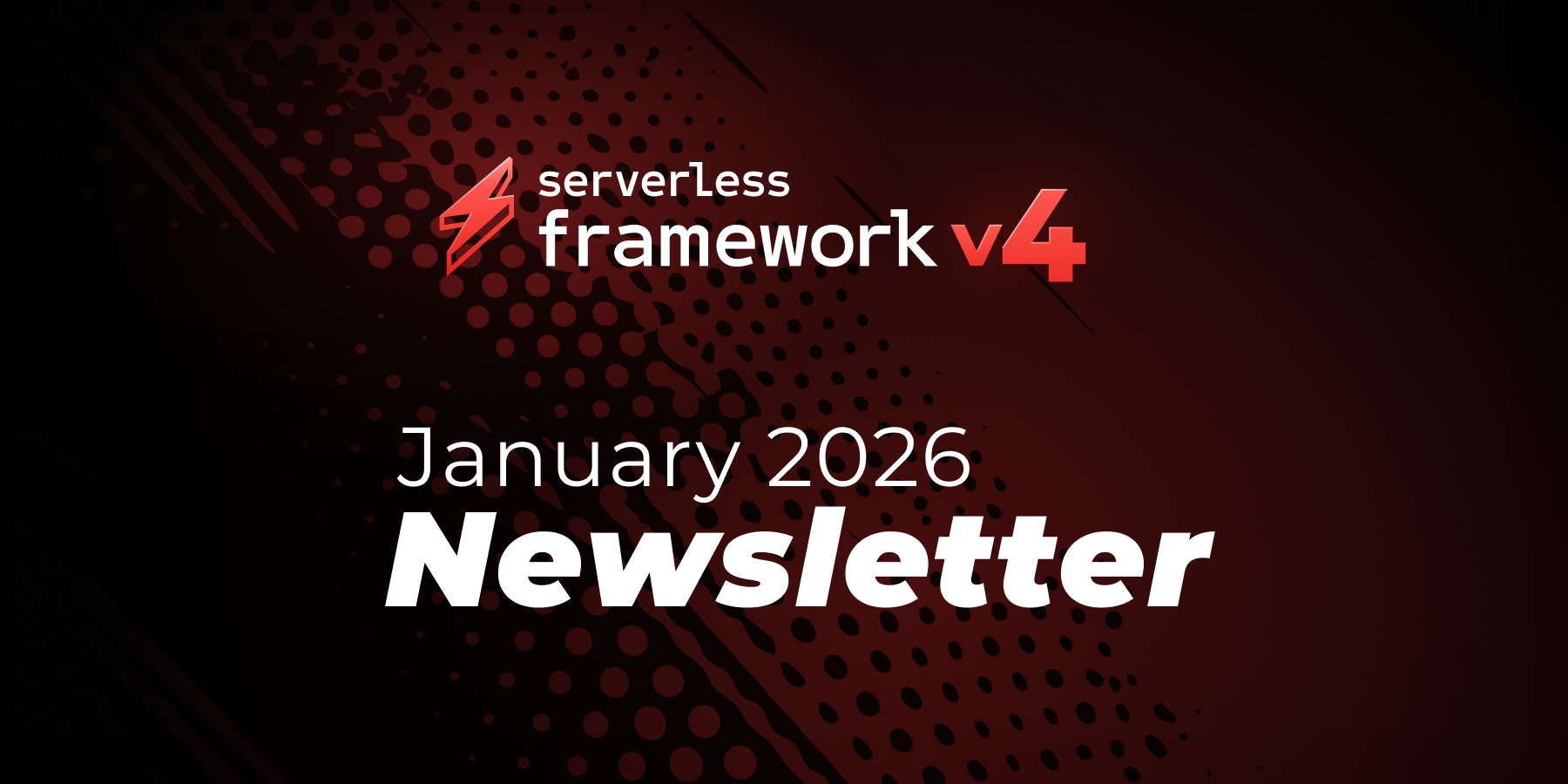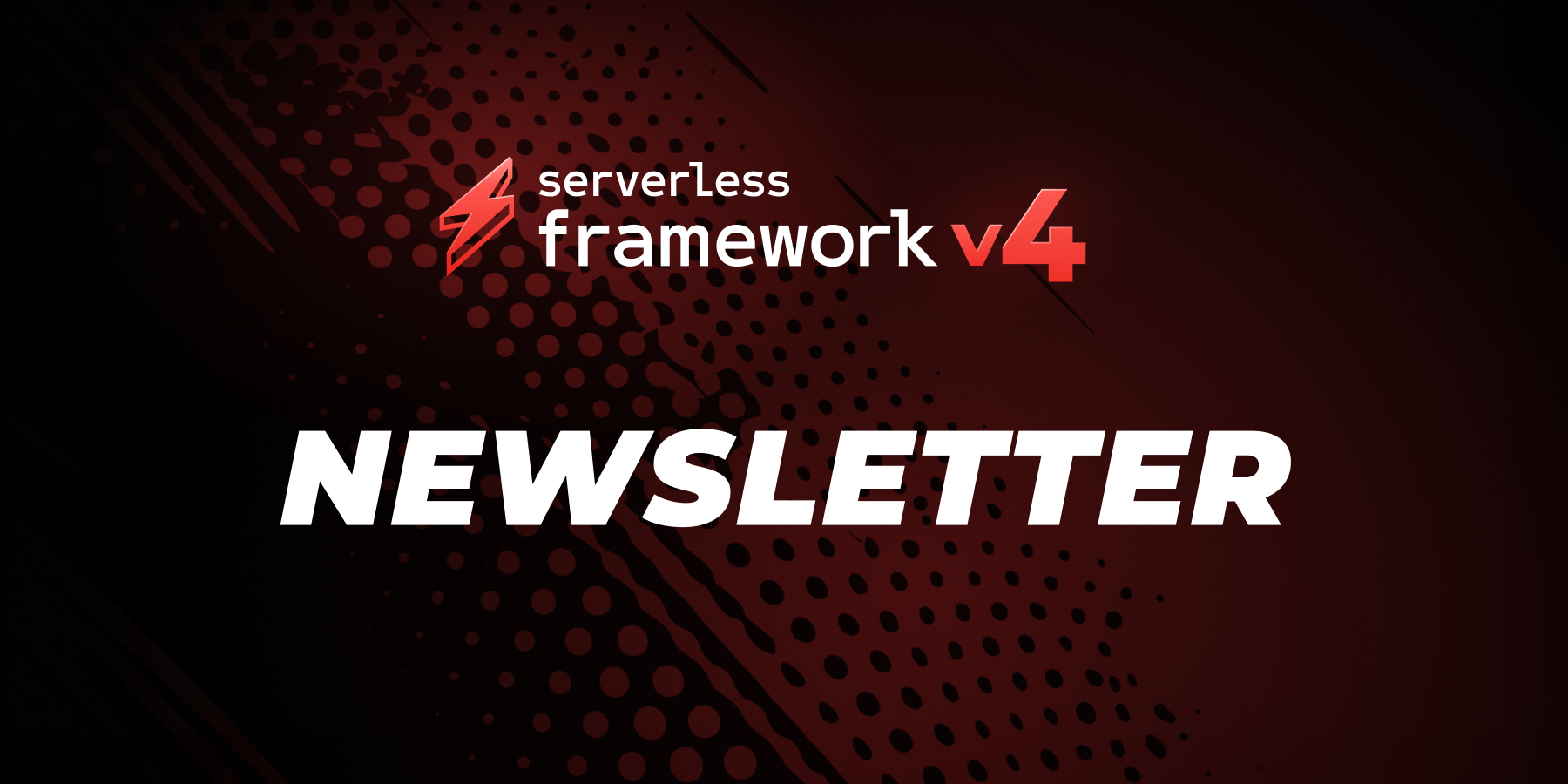
Today we're proud to release v1.13 of the Serverless Framework!
There's some really exciting new features in this release, let's look into them below.
Highlights of 1.13.0
Note: You can find a complete list of all the updates in the changelog.
Async value support for Serverless variables
The widely requested support for async serverless variables landed!
Serverless Variables can now refer to functions which return a promise, making the variable population super powerful.
Example use cases
- Fetch and include secrets from a remote database
- Connect variables to your team's secret management solution
- Pull data from internal resources/APIs
- Read config data from your CI/CD server
- ...
The possibilities are endless!
Let's take at a simple example how this looks like:
service: serverless-async-vars
provider:
name: aws
runtime: nodejs6.10
custom:
secret: ${file(./vars.js):fetchSecret} # JS file running async / promised// vars.js
module.exports.fetchSecret = () => {
// async code
return Promise.resolve('SomeSecretKey');
}You can read more about this new feature in the Serverless Variables docs.
Cross-service communication
One feature request which received lots of feedback and community-wide attention is the ability to do cross-service communication.
Building complex serverless apps oftentimes requires the application to be split up into separate services / stacks which are then managed and deployed in a microservice fashion.
However those services need to communicate with each other and e.g. share configuration.
Serverless v1.13 adds support for the new Serverless Variable type ${cf:} with the signature ${cf:stack.output-property}.
This variable type enables you a way to reference arbitray Outputs from CloudFormation stacks in your account.
Let's take a look at an example to see the how this feature can be used in a Serverless service.
In the serverless.yml file of "Service A" we add the memorySize to the Outputs section of our CloudFormation template and deploy the service as usual through serverless deploy.
service: service-a
provider:
name: aws
memorySize: 512
functions:
hello:
handler: handler.hello
resources:
Outputs:
memorySize:
Value: ${self:provider.memorySize}
Export:
Name: memorySizeNext up we have "Service B" in which we're importing the memorySize config of our previously deployed "Service A":
service: service-b
provider:
name: aws
memorySize: ${cf:service-a-dev.memorySize}
functions:
hello:
handler: handler.helloNote: The cf Serverless Variable can reference arbitrary Outputs from any CloudFormation stack in your account. It doesn't need to be a Serverless service stack.
Interested in more information about this feature? Make sure the check out the Servereless Variables docs!.
Lambda tags
AWS recently announced support for tagging Lambda functions.
Serverless v1.13 adds native support for this nifty feature.
Tags can be added with the help of the tags property on the function level. Tags are always defined as key-value pairs.
Here's an example showing how to add the stage: production tag to the hello function.
service: service
provider:
name: aws
runtime: nodejs6.10
functions:
hello:
handler: handler.hello
tags:
stage: productionTagging Lambda functions opens a wide variety of different use cases.
The most popular use cases seem to be around billing, for example analyzing overall costs based on Lambda tags (production vs. development). Tagging is also helpful to track Lambdas that use soon to be deprecated runtimes or code or need to be specifically tracked for some other purpose.
More about Lambda tagging can be found in the function docs.
Extensible info plugin
The AWS implementation of the info command now defines more fine-grained lifecycle events you can hook into.
Each information group that is returned when the results are gathered exposes it's own lifecycle event:
-> info:info
-> aws:info:validate
-> aws:info:gatherData
-> aws:info:displayServiceInfo
-> aws:info:displayApiKeys
-> aws:info:displayEndpoints
-> aws:info:displayFunctions
-> aws:info:displayStackOutputs
This makes the info plugin far more extensible.
Plugin authors can now hook into the lifecycle event before functions are displayed and modify the data accordingly.
hello-world starter template
Serverless v1.13 adds a new, beginner friendly hello-world template.
This template is used to streamline the onboarding process.
Just create the new service with serverless create --template hello-world and run serverless deploy and you're off to the races.
The hello-world template includes one function which is hooked up to a CORS enabled API Gateway endpoint.
It uses nodejs6.10 as the runtime and aws as the provider of choice.
Create the hello-world service with these terminal commands
# Make the directory
mkdir my-new-service
# change into the directory
cd my-new-service
# Create serverless hello world
serverless create --template hello-world
# Deploy it
serverless deployEnhancements & Bug Fixes
This release also includes a bunch of bug fixes and several enhancements.
Thanks for reporting bugs and opening issues!
Contributors
This release contains lots of hard work from our awesome community, and wouldn't have been possible without passionate people who decided to spend their time contributing to make Serverless better.
Thank You to all of the contributors who submitted changes for this release:
- Ben New
- Christos Matskas
- Frank Schmid
- Hyunsoo Daniel Kim
- Jonathan Goldwasser
- Ken Sykora
- Ryan Lewis
- Stewart Lord
- jarrett jordaan
Get Involved
Serverless has a really helpful, vibrant and awesome community. Want to help us build the best Serverless tooling out there?
Contributing isn't just about code! Chime in on discussions, help with documentation updates or review Pull Requests.
Just filter by our labels such as easy-pick, help-wanted or needs-feedback to find areas where you can help us!
Furthermore, we're always seeking feedback from our community to build the features in the best way possible. Here's a list with issues where we need your feedback and insights in your real world usage of Serverless.
Next Steps
We've already started filling in the next milestones. Check out the 1.14 milestone to see what we have planned for the next release.
We hope that you like the new release! Let us know if you have any questions or feedback in our Forum or GitHub Issues.
Serverless Examples
The Serverless Examples Repository is an excellent resource if you want to explore some real world examples and learn more about what Serverless architectures look like.


